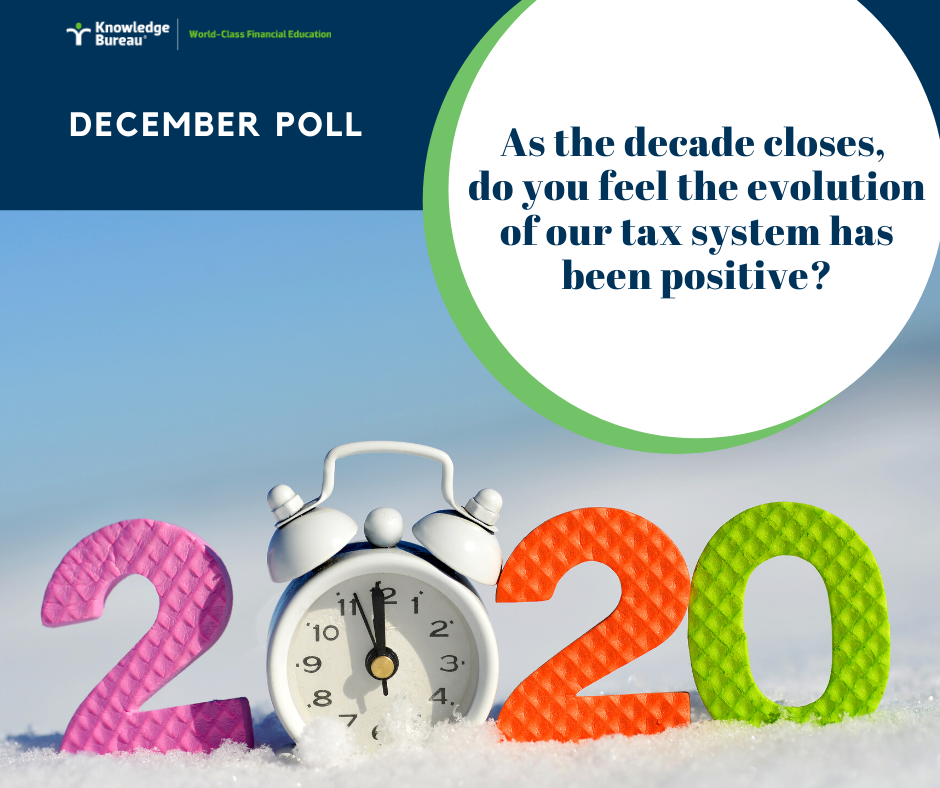Last updated: December 04 2019
Are Canadians Financially Literate? Professional Advisors Weigh In

Beth Graddon
New data from the 2019 Canadian Financial Capability Survey* shows that Canadians are under increasing financial stress. However, only 49% seek the help they need from tax and financial advisors. Additionally, according to the pros who answered Knowledge Bureau’s poll last month, there are significant knowledge gaps that exist among Canadians when it comes to their financial literacy. The reasons are both diverse and very interesting.
This poll question was initiated to bring awareness to November’s Financial Literacy Month: “Financial literacy is the knowledge, skills and confidence to make responsible financial decisions. Do you believe your clients are financially literate?” A resounding 78.05% of the respondants said “no”. Here are some of the fascinating comments that accompanied the poll:
Judy Butterworth makes a valuable point: “A small percentage (of our clients) are financially educated, the rest are seeking direction. By the time they have been with us a few years they are much more comfortable and able to ask good questions.”
Darlene highlights the importance of working with a professional: “Some of my clients understand their financial statements, but most of them rely on me to tell what is important.”
Stephen Pluhar commented: “Generally my clients are not that financially literate. I consider it part of my job to change that.”
Mitzi-Lynne Morgan says, “No, I am afraid my clients are not financially literate and show no interest in becoming so. Their financial expertise ends with spending more than they have and then misusing the credit cards. I have tried to impart a little financial knowledge, but since it involves not spending everything faster than it comes in, they have no interest. Most of them don’t  want to be bothered with actually earning any money, because the government is always ready with a handout. It is very sad.”
want to be bothered with actually earning any money, because the government is always ready with a handout. It is very sad.”
Pat believes financial literacy should be taught to Canadians earlier:Bottom of Form “Financial literacy belongs in the classroom. It should be taught right along with math. High school is a great start if not earlier, especially those interested in accounting. I went to a “commercial school” they touched on financial subjects e.g. stock market as an afterthought. Most of my clients are completely unaware of how to make money other than working your hours or how to even save for retirement. Since they lack the skills and knowledge, it’s up to us to assist them and provide them with the products they need for protection, a fruitful life and retirement.”
Frank says: “It is a shame that in such highly-developed country like our Canada, not enough is being done to bring financial literacy knowledge and skills of the citizen and taxpayers to a higher standard. This starts in public and high school and goes to workplaces, banks and other stakeholders who could play an important role. Yes, we have to train our clients, almost every one of them. Most have little to no financial literacy skills and a lot of clients are terrified of the CRA. It’s a real challenge, every day.”
Rosalind Kemp Gleave comments on the differences and challenges based on client profiles: “Many of my clients are - or were - low income. They are afraid to take ANY risk with their limited resources, and often their social services workers are unaware of new/changing rules relating to client finances. How can these most vulnerable clients make responsible financial decisions when they are made to feel like second-class citizens?”
Roberto says, “I would say that less than half of my clients are somewhat financially literate. Socio-economic class generally has the most to do with where an individual stands on that scale, but not always."
Patrick Bailey: “I find that the level of literacy varies based on type of employment and industry. The income levels do not appear to have much of an impact on financial literacy. However, higher incomes do allow for the affordability of people who are financially literate.”
Karen Costello points out the value of continuing education for advisors themselves: “The more we educate ourselves, the greater value we are towards educating our clients.”
Weigh in on this month’s poll, where we ask, “As the decade closes, do you feel the evolution of our tax system has been positive?”
Additional educational resources: Debt is the number one financial issue in Canada today. The Debt and Cash Flow Management certificate course will help students advise their clients on what debt is and how to use it properly to manage debt and cash flow to accumulate wealth for the future. Enrol or take a free trial today.
COPYRIGHT OWNED BY KNOWLEDGE BUREAU INC., 2019.
UNAUTHORIZED REPRODUCTION, IN WHOLE OR IN PART, IS PROHIBITED.

